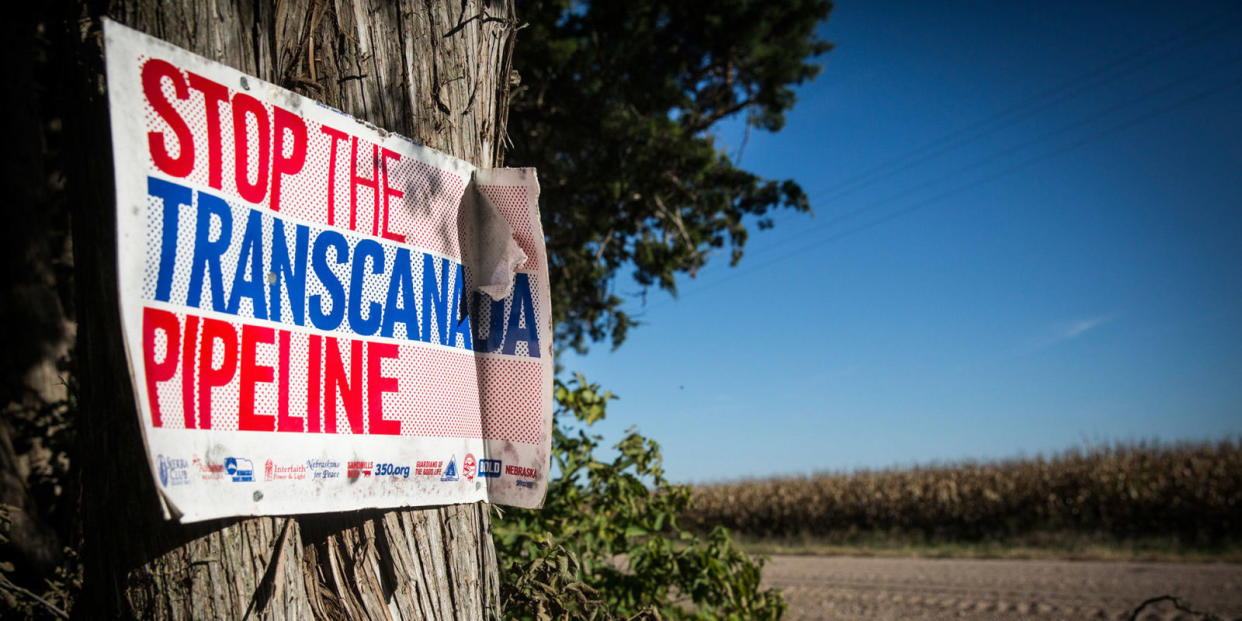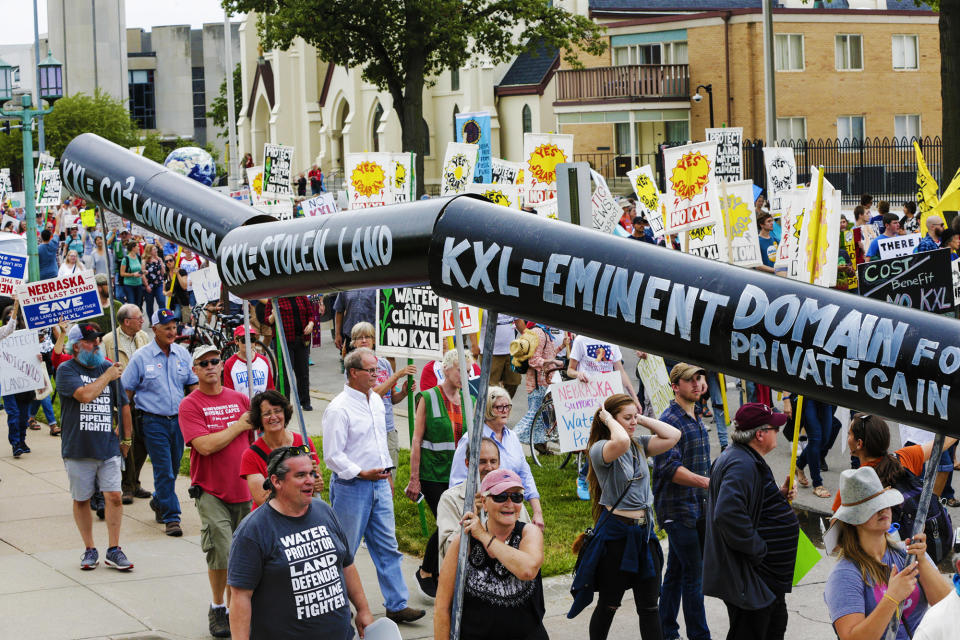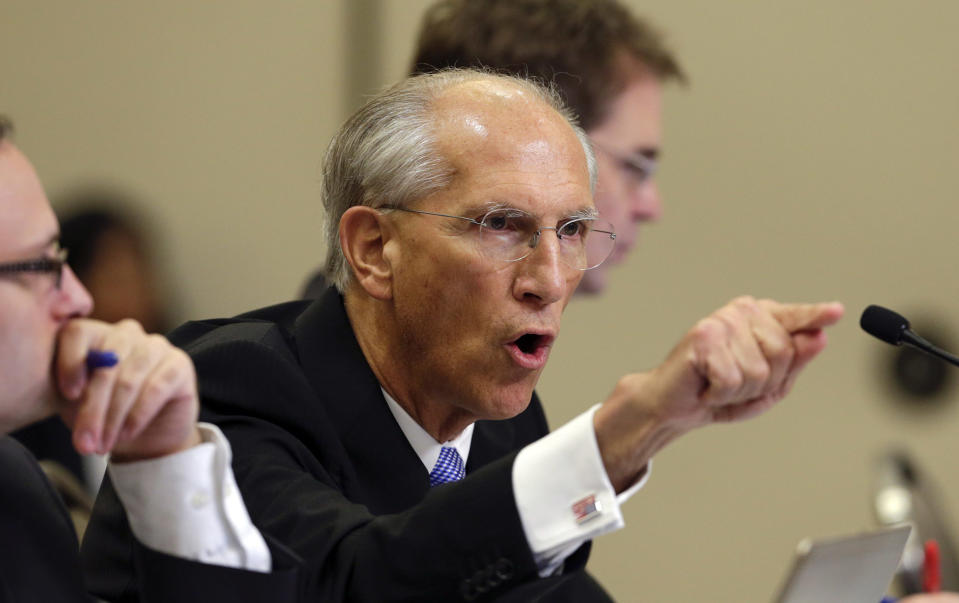What Is the Keystone Pipeline Fight Really About?

LINCOLN, NEBRASKA-One of the interesting characteristics of the hearings here before the Nebraska Public Service Commission regarding our old friend, the Keystone XL pipeline, the continent-spanning death funnel and perennial Republican fetish object, is that they thus far are so granular. Some of that is because of the tightly circumscribed list of issues that the commission is tasked with handling. But a great deal of it has to do with the fact that the alliance in opposition to the pipeline is energized not only by environmental concerns, but also, and shrewdly, by opposition on the part of ranchers and farmers to the high-handed way TransCanada has treated them, particularly the presumptuous way the Canadian energy behemoth has dealt with the issues of easements and eminent domain. So the fact that the Alberta tar-sands, the death potions the proposed pipeline will carry over the Oglalla Aquifer and down the spine of the country, is an environmental catastrophe from the moment it comes out of the earth to the moment its end product is dispatched into the atmosphere, is curiously far from the context of these hearings.
For example, while the witnesses for TransCanada were being grilled by the lawyers for Nebraska landowners, The New York Times got a hold of a copy of a draft report on climate change that was compiled by 12 government agencies. (The leak, the Times reported, occurred because some of the people who compiled it are afraid that the current agency would bury it.) The conclusions are nothing short of chilling.

The report concludes that even if humans immediately stopped emitting greenhouse gases into the atmosphere, the world would still feel at least an additional 0.50 degrees Fahrenheit (0.30 degrees Celsius) of warming over this century compared with today. The projected actual rise, scientists say, will be as much as 2 degrees Celsius. A small difference in global temperatures can make a big difference in the climate: The difference between a rise in global temperatures of 1.5 degrees Celsius and one of 2 degrees Celsius, for example, could mean longer heat waves, more intense rainstorms and the faster disintegration of coral reefs. Among the more significant of the study's findings is that it is possible to attribute some extreme weather to climate change. The field known as "attribution science" has advanced rapidly in response to increasing risks from climate change.
Tar sands, and the oil that they produce, and the chemicals needed to make the oil worth anything, are all terrible environmental hazards. But, here in Lincoln, they are background noise, a kind of subtext to all the testimony, which was marked by remarkably blasé presentations by TransCanada's witnesses.
On Monday, the company did not present a single witness who worked for the company-TransCanada Keystone Pipeline-that actually has applied for the pipeline route. David Domina, the lawyer for the Nebraska landowners, intimated that the company was trying to build corporate firewalls to keep any problems from reaching the actual applicant. Meanwhile, the TransCanada witnesses called to testify before the commission on Monday were almost universally unqualified to speak on this specific project in this specific state. For example, the company is not even planning to present a witness regarding the effect of the pipeline on potential damage to cultural sites, specifically, to historical and sacred sites belonging to the Native peoples along the pipeline route.

Instead, TransCanada plans to produce a "rebuttal" witness after the Native people present their witnesses later in the week. Among the witnesses the company did produce, there was an economics professor who had to admit that a report he presented to the commission regarding the vast economic benefits of the project was merely an update of a report he'd written for a Texas-based energy business group. There was an environmental consultant who had to admit that she didn't know much about the land under which the pipeline is proposed to run, and there was a company expert on reclaiming land who used an outdated wildlife protection map to show that the pipeline would travel through less of the environmentally delicate sandhills region of Nebraska than was shown on the map TransCanada originally had presented to the State Department months ago.
The PSC is an elected body made part of the Nebraska Constitution in 1906, a Progressive initiative primarily designed to control the depredations of the railroad trusts. Because this is the second iteration of the kind of Gilded Age the Progressives originally formed themselves to fight, the fact that this is an elected body in a period of rampant money power in politics undermines the PSC's original mission. According to Common Cause, 76 percent of the contributors to the campaigns of the commissioners came from the industries the PSC is supposed to regulate. And the influence of the money power goes beyond the money that sluices into campaigns.
Last session, the Legislature put pipeline routing under the Public Service Commission's regulatory purview. While TransCanada, the builder of the Keystone XL pipeline, is prohibited as a foreign company from contributing directly to election campaigns, US companies are not so constrained. And we have seen that the oil industry wields a lot of financial clout: TransCanada, though restricted from contributing to campaigns, has been the top spender on lobbying in the state.
But, from the hearing room, all you hear is the end product of larger things that are happening elsewhere-the climate crisis, the crisis of money in our politics. You can see the effect on the smaller things and the smaller places. You can see the slow grinding to bits of what once was ordinary life.
Respond to this post on the Esquire Politics Facebook page.
You Might Also Like

